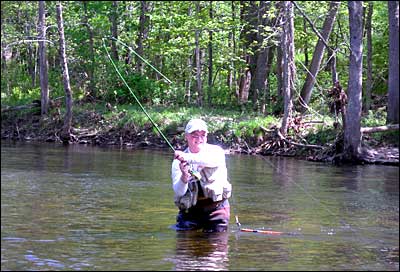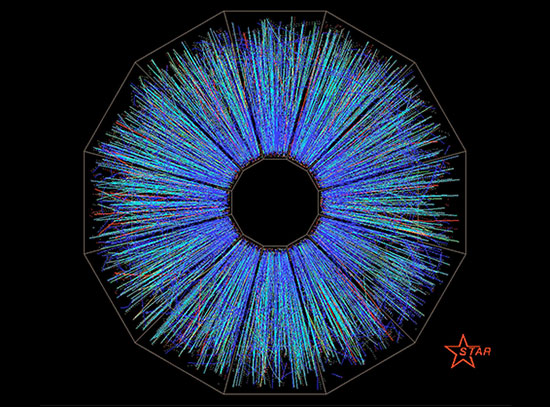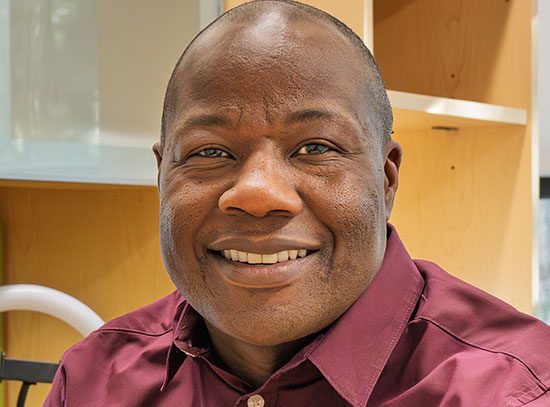Meet Ed Whittle, Fly Fisherman
June 25, 2008
Ed Whittle, a biochemist research associate at BNL since 1985, is always up for a challenge. At work, he spends much of his time researching plant enzyme biosynthesis in the basement of the Biology building. Outside of work, Whittle enjoys the challenge of fly-fishing in the rivers of Long Island and Connecticut.

Ed Whittle
A Greenport resident and former Peace Corp volunteer, Whittle started fly-fishing nearly 30 years ago. "Fly-fishing is highly technical," he explained. The challenge of fly-fishing lies in "matching the hatch," using artificial flies resembling the aquatic insects that fish naturally feed on, and presenting these imitations so they mimic the natural behaviors of their animate counterparts. "I have an enormous collection of artificial flies, probably close to 1,000 different sizes, types, and life forms," Whittle said. "It's about trying to connect with the fish and what they're actually feeding on which can be extremely challenging at times. You have to have great patience and focus."
Equipped with a rod and reel, net, assortment of flies, and waders, Whittle regularly journeys to Connecticut's Farmington and Long Island's Carmans rivers exclusively fishing for trout and releasing every fish caught following the fly-fisher's philosophy of "catch and release." If a caught fish is unable to swim off after the hook is removed, Whittle will hold the fish upstream allowing water to pass over the fish's gills supplying the oxygen needed to recover and swim away. "It's a whole emotional connection when you have raised a big fish to fly, hooked, landed, and released it. I like to enable others to enjoy that same experience, so we return the fish to its environment," he added.
According to Whittle, "the sport really grows when you have conversations with other fly-fishermen on the river who are sharing information about the aquatic insects or 'what's hatching.' There is a lot of camaraderie in the fly-fishing community." Most share the same river philosophy, so information flows quite freely when you are fishing waist- to chest-deep to rising fish in the river. When he's not on the river, Whittle, who has a Master's degree in science education, also keeps information flowing as a member of the Trout Unlimited, a national organization that works to conserve, protect, and restore natural coldwater fish and their habitats, and by actively participating in online discussion forums dedicated to fly-fishing.
"Everyone wants to catch the 20+-inch-long trout but that's not all it's about" he explained. He has caught 18+-inch fish on very light line and had many "big boys" break off, but this ardent outdoorsman even more enthusiastically recalls witnessing a mother merganser (diving duck) carrying 10 hatchlings on her back, mink cubs and beavers on riverbanks, hummingbirds sipping at trumpet flowers, and eagles diving for fish in the water. As a father of two boys, a soccer coach, and a Cub and Boy Scout leader, Whittle adamantly promotes volunteerism in hope of sharing the joys of the outdoors with the young generation. "In this day and age, kids need more guidance than they needed in the past because of their indoor amusements," he said. "I like to show kids the pleasure and enjoyment that an appreciation of our outdoor environment and fishing can provide."
Whittle advised those interested in the challenge of fly-fishing to "start with low expectations, great patience, and go with someone who has technical knowledge of this sport." He added, "Realize that fly-fishing is not only about catching fish, it's about communing and connecting with nature."
 Think you or one of your colleagues has a good story to tell? Email us! Although we can't write about everyone, we would love to hear your ideas and suggestions.
Think you or one of your colleagues has a good story to tell? Email us! Although we can't write about everyone, we would love to hear your ideas and suggestions.
2008-753 | INT/EXT | Newsroom









